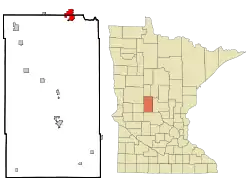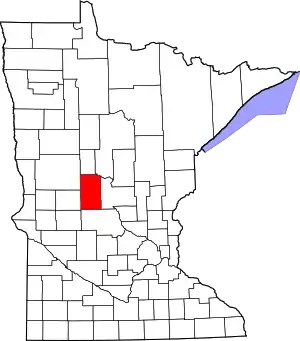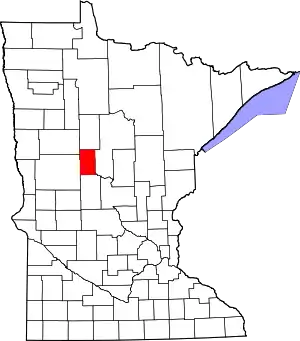Staples, Minnesota
Staples is a city in Todd and Wadena counties in the U.S. state of Minnesota. The population was 2,989 at the 2020 census.[3]
City of Staples | |
|---|---|
 Combined city hall and public library | |
 Location of Staples, Minnesota | |
| Coordinates: 46°22′09″N 94°48′07″W | |
| Country | United States |
| State | Minnesota |
| Counties | Todd, Wadena |
| Founded | 1889 |
| Incorporated | 1906 |
| Government | |
| • Mayor | Ron Murray |
| • City Administrator | Jerel Nelsen |
| • Economic Development | Melissa Wyman |
| • Police Chief | Melissa Birkholtz |
| • Fire Chief | Cole Yungbauer |
| Area | |
| • Total | 4.77 sq mi (12.34 km2) |
| • Land | 4.76 sq mi (12.33 km2) |
| • Water | 0.01 sq mi (0.01 km2) |
| Elevation | 1,273 ft (388 m) |
| Population | |
| • Total | 2,989 |
| • Estimate (2021)[4] | 2,998 |
| • Density | 627.81/sq mi (242.39/km2) |
| Time zone | UTC-6 (CST) |
| • Summer (DST) | UTC-5 (CDT) |
| ZIP code | 56479 |
| Area code | 218 |
| FIPS code | 27-62446[5] |
| GNIS feature ID | 2395955[2] |
| Website | staples.gov |
History
Staples developed around a sawmill.[6] The settlement was originally called Staples Mill, and under the latter name was platted in 1889, and named for Samuel and Isaac Staples, businessmen in the lumber industry.[7]
Geography
According to the United States Census Bureau, the city has a total area of 4.68 square miles (12.12 km2); 4.67 square miles (12.10 km2) is land and 0.01 square miles (0.03 km2) is water.[8]
U.S. Route 10 and Minnesota State Highway 210 are two of the main routes in the city. The Empire Builder, an Amtrak route connecting Chicago with Seattle and Portland, Oregon, stops at the train station in Staples.

Demographics
| Census | Pop. | Note | %± |
|---|---|---|---|
| 1890 | 585 | — | |
| 1900 | 1,504 | 157.1% | |
| 1910 | 2,558 | 70.1% | |
| 1920 | 2,570 | 0.5% | |
| 1930 | 2,667 | 3.8% | |
| 1940 | 2,952 | 10.7% | |
| 1950 | 2,782 | −5.8% | |
| 1960 | 2,706 | −2.7% | |
| 1970 | 2,755 | 1.8% | |
| 1980 | 2,887 | 4.8% | |
| 1990 | 2,754 | −4.6% | |
| 2000 | 3,104 | 12.7% | |
| 2010 | 2,981 | −4.0% | |
| 2020 | 2,989 | 0.3% | |
| 2021 (est.) | 2,998 | [4] | 0.3% |
| U.S. Decennial Census[9] 2020 Census[3] | |||
2010 census

As of the census of 2010, there were 2,981 people, 1,222 households, and 696 families living in the city. The population density was 638.3 inhabitants per square mile (246.4/km2). There were 1,469 housing units at an average density of 314.6 per square mile (121.5/km2). The racial makeup of the city was 95.9% White, 0.5% African American, 0.9% Native American, 0.7% Asian, 0.3% from other races, and 1.6% from two or more races. Hispanic or Latino of any race were 1.5% of the population.
There were 1,222 households, of which 30.5% had children under the age of 18 living with them, 39.0% were married couples living together, 12.7% had a female householder with no husband present, 5.3% had a male householder with no wife present, and 43.0% were non-families. 37.0% of all households were made up of individuals, and 16.8% had someone living alone who was 65 years of age or older. The average household size was 2.26 and the average family size was 2.94.
The median age in the city was 38.8 years. 24.1% of residents were under the age of 18; 10% were between the ages of 18 and 24; 21.8% were from 25 to 44; 22.5% were from 45 to 64; and 21.6% were 65 years of age or older. The gender makeup of the city was 47.6% male and 52.4% female.
2000 census
As of the census of 2000, there were 3,104 people, 1,278 households, and 732 families living in the city. The population density was 684.5 inhabitants per square mile (264.3/km2). There were 1,436 housing units at an average density of 316.7 per square mile (122.3/km2). The racial makeup of the city was 97.49% White, 0.26% African American, 0.81% Native American, 0.35% Asian, 0.23% from other races, and 0.87% from two or more races. Hispanic or Latino of any race were 1.48% of the population. 33.5% were of German, 12.5% Norwegian, 6.4% American, 6.0% Irish and 5.9% Swedish ancestry.
There were 1,278 households, out of which 30.5% had children under the age of 18 living with them, 41.8% were married couples living together, 12.1% had a female householder with no husband present, and 42.7% were non-families. 35.8% of all households were made up of individuals, and 19.2% had someone living alone who was 65 years of age or older. The average household size was 2.36 and the average family size was 3.09.
In the city, the population was spread out, with 27.2% under the age of 18, 11.4% from 18 to 24, 24.0% from 25 to 44, 18.6% from 45 to 64, and 18.8% who were 65 years of age or older. The median age was 36 years. For every 100 females, there were 92.4 males. For every 100 females age 18 and over, there were 91.6 males.
The median income for a household in the city was $25,208, and the median income for a family was $33,472. Males had a median income of $26,481 versus $18,407 for females. The per capita income for the city was $14,244. About 15.4% of families and 20.3% of the population were below the poverty line, including 23.9% of those under age 18 and 9.4% of those age 65 or over.
Notable people
- Norbert P. Arnold, Minnesota State Senator[10]
- Loren Bain, pitcher for the San Francisco Giants of Major League Baseball[11]
- Dick Bremer, TV broadcaster for the Minnesota Twins[12]
- Kathryn Edin, William Church Osborn Professor of Sociology and Public Affairs, at Princeton University[13]
- Richard Nelson Gardner (1881-1953), Minnesota state senator and lawyer[14]
- Jon Hassler (1933 – 2008),[15] American writer known for his novels about small-town life in Minnesota[16]
- Dave Joerger, professional basketball coach with the Sacramento Kings (NBA)[17]
- Bruce G. Nelsen, Minnesota legislator[18]
- Alfred E. Perlman, President of the New York Central Railroad and Western Pacific Railroad
- Dallas Sams, Minnesota legislator
- Gil Skeate, fullback for the Green Bay Packers of the NFL[19]
- LaVyrle Spencer, best-selling author of romance novels, attended high school in Staples[20]
- Frankie Thorn, actress
Transportation
The Amtrak station sees more than 5,000 riders a year get on or off the daily Empire Builder service.[21] The west bound train from Chicago and St Paul arrives an hour or two after midnight, heading toward Fargo and Seattle/Portland. East bound Empire Builders from Fargo arrive about 4 a.m. heading toward a daylight arrival in St Paul and an afternoon arrival in Chicago.
Media
The official weekly newspaper of Staples is the Staples World, with a circulation of 2,400.
References
- "2020 U.S. Gazetteer Files". United States Census Bureau. Retrieved July 24, 2022.
- U.S. Geological Survey Geographic Names Information System: Staples, Minnesota
- "Explorer Census Data". United States Census Bureau. Retrieved May 4, 2022.
- "City and Town Population Totals: 2020-2021". United States Census Bureau. August 10, 2022. Retrieved August 10, 2022.
- "U.S. Census website". United States Census Bureau. Retrieved January 31, 2008.
- Winser, Henry Jacob; Riley, William C. (1897). The Official Northern Pacific Railway Guide: For the Use of Tourists and Travelers Over the Lines of the Northern Pacific Railway and Its Branches. Northern Pacific Railway. p. 53.
- Upham, Warren (1920). Minnesota Geographic Names: Their Origin and Historic Significance. Minnesota Historical Society. p. 546.
- "US Gazetteer files 2010". United States Census Bureau. Archived from the original on January 25, 2012. Retrieved November 13, 2012.
- United States Census Bureau. "Census of Population and Housing". Retrieved July 14, 2014.
- "Arnold, Norbert P. - Legislator Record - Minnesota Legislators Past & Present". www.lrl.mn.gov. Retrieved October 15, 2021.
- "Loren Bain Stats". Baseball-Reference.com. Retrieved October 15, 2021.
- Dorr, Luther. "TIMEOUT: Twins heat up Hot Stove League". Princeton Union-Eagle. Archived from the original on September 28, 2007. Retrieved March 22, 2007.
- "Kathryn Edin".
- "Gardner, Richard Nelson "Dick" - Legislator Record - Minnesota Legislators Past & Present". www.lrl.mn.gov.
- Baenen, Jeff (AP) (March 21, 2008). "'Staggerford' author Jon Hassler dies at 74 (obituary)". USA Today. Retrieved June 15, 2010.
- "Biography". Archived from the original on October 15, 2012. Retrieved July 11, 2013.
- "NBA.COM". NBA.com. Retrieved July 10, 2013.
- "Nelsen, Bruce G. - Legislator Record - Minnesota Legislators Past & Present". www.lrl.mn.gov.
- "Gil Skeate Stats, News and Video - FB". NFL.com. Retrieved October 15, 2021.
- "LaVyrle Spencer". IMDb. Retrieved October 4, 2012.
- "Fact sheet: Amtrak in Alabama" (PDF). narprail.org. Archived (PDF) from the original on April 16, 2022. Retrieved August 6, 2023.

